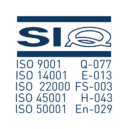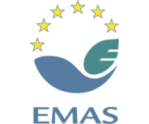On Friday 28th August 2009, at its inaugural session in the new composition, the Luka Koper Supervisory Board was familiarised with LK Group performance over the first half of this year. The results presented reflect the harsh economic conditions which persisted throughout the second quarter. Following last year’s record levels, the year-on measure cargo throughput volume fell by 21% over the first six months of 2009. This downturn affected Group revenues, which recorded a year-on decline of 14%; operating costs were off 1%, whilst net operating profit amounted to
€ 6.9 million, a 76% fall; net profits for the first half of 2009 thus stood at
€ 3.7 million.
As to liquidity, and if essential investments in the expansion of port infrastructure are put to one side, the Group is fully independent, self sustaining and profitable. Indeed, Koper is one of the few ports in Europe – and most definitely the only port in the Adriatic – where essential infrastructure is not publicly funded by the state or local authorities. The Port of Koper is entirely financed by the concessionaire – Luka Koper d.d. – and the investments it is making are of crucial importance in maintaining its highly competitive edge, expanding facilities to accommodate further growth and enhanced profitability, as well as continuing to build upon the longstanding returns it has generated for its shareholders.
The unfavourable economic climate has forced the further implementation of cost efficiency measures across the entire company, and these instruments have, to a large extent, been successful; at the same time material costs are down by 17% on the same period last year, which is particularly attributable to lower energy prizes. The decreased volume of cargo throughput and optimisation of internal transport has contributed to a 16% cut in service costs, this despite the fact that the liability payable to the state as a concession fee amounted € 1.8 million.
Efficient management and reduction of outlay will be further pursued during the second half of the year. Labour costs – accounting for 37% of total expenses – will present the biggest challenge; indeed, labour costs increased by 16% on the first half of 2008, this was due in particular to a new systematisation of positions as well as the implementation of the Collective Agreement which was renewed in October 2008. Although, with hindsight, the timing as to the amendment of the 11-year old agreement might not have been at its best, especially considering the economic crises, it was nevertheless the fruit of several months of negotiations. Furthermore, port operations are by their nature labour intensive, and accordingly employee satisfaction is of key significance in the provision of the quality services that the port’s clients require and indeed demand; this reality has to forever be taken into account. The Port of Koper is open 24-7, 365 days a year, and hasn’t suffered a strike in over 20 years. Such factors are a major contribution to the fact that the economic recession has affected Koper’s business to a far lesser extent than other European ports.
In addressing the issue of a downturn in cargo throughput, a line has to be drawn between individual cargo types. In some areas the volume levels attained last year have been maintained or even exceeded in the first half of 2009, whilst others are indeed sharing the same destiny as the economy as a whole. As regards container freight, the company recorded a mere three percent drop, and accordingly has exceeded the projected volume for the first two quarters of this year by the same percentage. It is also worthy of mention that the downturn in Koper’s container business is relatively small in comparison to other ports in the region. This particular instance also proves the significance of the investment in the extension of Pier I and the acquisition of new better-performance cranes which are able to service the large post-panamax vessels that since mid-June have been providing a regular weekly direct link between the Port of Koper and the Far East.
Timber throughput also turned in a good performance, registering a year-on increase of 13%, whereas perishables – fruit and vegetables – remain similar to last year’s levels. Liquid cargos have witnessed intensive growth, in particular due to the doubling of capacities over the last year attributable to the construction of jet fuel tanks. Not long ago Luka Koper commenced construction of a new alcohol terminal which is – as is the case with the avgas facility – being especially built for a client on the basis of a contractual agreement.
The global downturn, and in particular the recession in the automotive and steel sectors, have mainly affected the throughput of dry bulk cargos (coal, iron ore and minerals) as well as, of course, vehicles, together with all those general cargos which pertain to the car industry. This said, however, the following months appear more promising. By year’s end, the Car Terminal is anticipated to accomplish 60% of projected performance, the European Energy Terminal 74%, and Dry Bulk Cargo 86% of projections. All other terminals will attain – and some even surpass – anticipated volumes, and thereby the anticipated revenues too.
The harsh economic climate has once again proven the benefits of cargo diversification at the Port of Koper. This diversity and adaptability, combined with quality services, further cost reduction, the careful planning of cash flows together with an ever-increasing market share, are a warranty that the second half of the year will witness a better performance.
The Management Board




